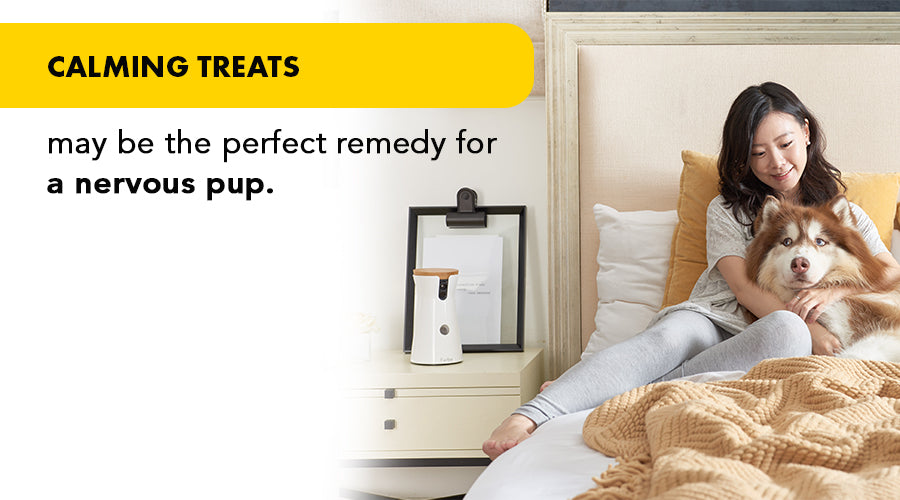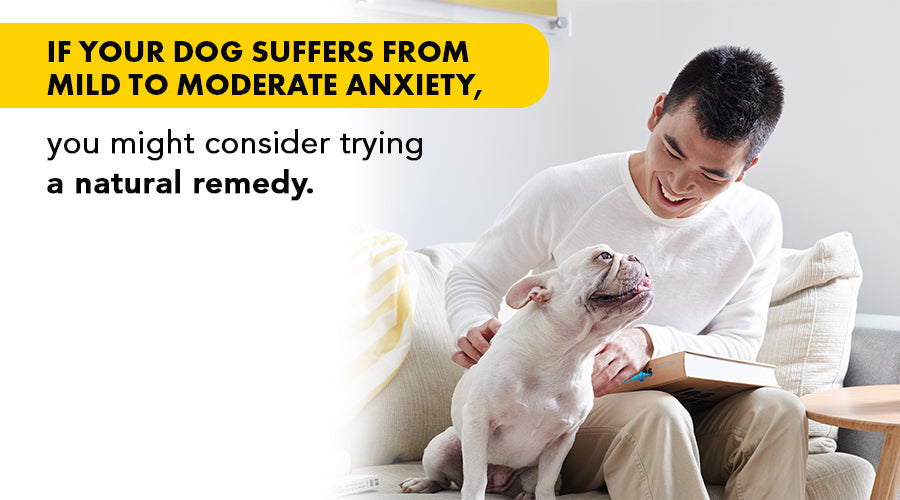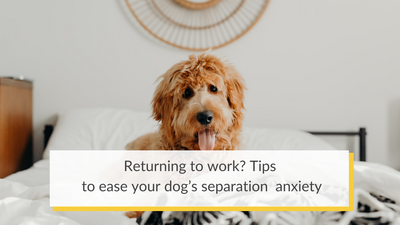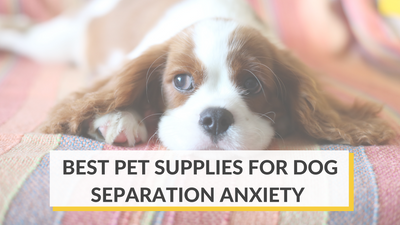It’s hard to know your dog is suffering from anxiety, and naturally, you want to do anything you can to help them. You might consider anti-anxiety meds for your dog.
Every dog is different. Some may not take well to medication, but others may benefit greatly. Some medications are also only meant to be used long-term while others are only-as-needed.
It is always best to seek the advice of a veterinarian before giving your dog any medication. Also, consult a veterinarian to rule out other possible causes of anxious behavior.
Just as there are many remedies for anxiety in people, there are different types of anxiety-reducing remedies for dogs. Some medications are prescribed or available over the counter, while others are considered natural remedies. For something perhaps less extreme, relaxing treats may be enough to help your furbaby rest when you leave them home alone.
Here’s a look at different anti-anxiety options to help you figure out the best medication for your dog.
- Separation Anxiety Medication

If your furbaby’s anxiety is moderate to severe, a prescription medication may be the way to go. First, a veterinarian will determine if any health conditions are to blame for your dog’s anxious behavior. However, if separation anxiety is the culprit, your vet may prescribe an anti-anxiety med for your dog’s specific needs. Many medications are available in tablet, pill or liquid form.
Popular separation anxiety medications for dogs include:
- Alprazolam: Alprazolam is a benzodiazepine and is usually prescribed for situational anxiety, like fear of thunderstorms. It’s available in tablet or liquid form and can take four weeks to become effective.
- Amitriptyline: Amitriptyline can be used to treat separation anxiety or generalized anxiety disorder. It boosts mood by increasing serotonin and norepinephrine and is available in tablet form. Dogs should be tapered off this medication after a week or two.
- Buspirone: This medication may be prescribed for mild anxiety. Its usually used for dogs who become anxious in social situations or around other dogs. Buspirone is available in tablet form.
- Clomipramine: Clomipramine is an FDA-approved treatment for separation anxiety and is a tricyclic antidepressant. Tricyclic refers to the three rings in the chemical structure. This medication is available in tablet form.
- Dexmedetomidine: This medication helps anxiety associated with noise-aversion, but it may also be prescribed for separation anxiety depending on your dog’s situation. Dexmedetomidine is approved by the FDA, is available in liquid form and is absorbed by mucous membranes.
- Diazepam: Diazepam is part of the benzodiazepine class of sedatives and is administered before an anxiety-inducing event occurs. Diazepam is available in spray, liquid or tablet form.
- Fluoxetine: Fluoxetine is FDA-approved for separation anxiety, but it can also be used for other types of anxiety. It increases serotonin in the brain and is available in tablet or liquid form. A dog is meant to be tapered off this medication after two months or longer.
- Lorazepam: Lorazepam is a benzodiazepine meant to be given at the first sign of anxiety. It is available in spray, tablet or liquid form.
- Paroxetine: This medication increases serotonin and is prescribed for a variety of anxiety types. Paroxetine comes in tablet or liquid form, and your dog should be tapered off it after two months or longer.
- Sertraline: Sertraline is used for a variety of anxiety types and boosts serotonin. It is available in liquid or tablet form, and your dog should be tapered off this medication in two months or longer.
If separation anxiety has a grip on your furbaby, it might be time to consult a doctor and find out if a prescription medication is the best option. The right medication combined with coping skills can help your furbaby live anxiety-free. Also, you’ll have a lot less anxiety when you walk out the door, knowing your dog is content, safe and okay with your absence.
- Calming Treats

If prescription medication seems too extreme for your furbaby, calming treats may be the perfect remedy for a nervous pup. There are so many options on the market that it should not be hard to find a treat your dog enjoys.
Also, what dog doesn’t love a tasty treat? A treat will make your dog feel special before you leave and doesn’t require swallowing a pill. Plus, there are fewer side effects to worry about, and doggy snacks provide nutrients.
Here are a few of our favorite calming treats for dogs that you can use to soothe your furbaby:
- Isle of Dogs Chillout Treats: Chillout treats are nutrient-rich, 100 percent natural and contain calming lavender and lemon balm extract.
- Pet Naturals of Vermont calming treats: These popular treats are both tasty and reduce stress.
- Zesty Paws Calming Soft Chews: Flavorful treats that contain relaxing ingredients like L-theanine and chamomile.
- Nylabone: Available in yummy chicken or bacon flavors, a Nylabone discourages destructive chewing and helps relieve stress.
If you want to give calming treats a shot, you shouldn’t have to look far as there are many options to choose from. Your furbaby will love you for caring so much, but don’t feel bad if they’re glad to see you go!
- Natural Remedies

You might say natural remedies fall somewhere between medication and calming treats. If your dog suffers from mild to moderate anxiety, you may not need a prescription, and you might consider trying a natural remedy.
Natural remedies have fewer side effects than prescription medication, and many are available in liquid or tablet form. Some natural remedies involve the use of calming aides. Here are a few recommendations to consider:
- Nutritional supplements: L-theanine increases serotonin, dopamine and gamma-aminobutyric acid or S-adenosylmethionine (SAMe) which increases serotonin, dopamine and norepinephrine levels.
- Homeopathic treatments: Rescue Remedy which is a diluted liquid made of five flowers or HomeoPet Anxiety Relief drops.
- Pheromone therapy: A version of the hormone mothers produce when nursing puppies and has a calming effect.
- Calming Aides: The Anxiety Wrap or ThunderShirt both provide pressure, which calms dogs during thunderstorms or trips to the vet.
- Your Scent: You can simply leave behind recently-worn clothes or objects that hold your scent.
There are many ways you can help your furbaby cope with separation anxiety with both natural and prescribed remedies. Plus, we will soon discuss training methods that can make a difference.
So, if you’ve been worried about your furbaby, you can exhale. Lots of our canine friends experience this condition, which means you and your furbaby are far from alone, and help is available.
Table of Contents
- Introduction: How to Help a Dog With Separation Anxiety
- Chapter 1: Dog Separation Anxiety Symptoms
- Chapter 2: Medication for Separation Anxiety in Dogs
- Chapter 3: Best Toys for Dogs With Separation Anxiety
- Chapter 4: Dogs Breeds With Separation Anxiety
- Chapter 5: How to Help Puppies With Separation Anxiety
- Chapter 6: How to Train a Dog With Separation Anxiety
- Chapter 7: How Furbo Helps With Separation Anxiety
- Conclusion/Chapter 8: Why Some Dogs Have Separation Anxiety












